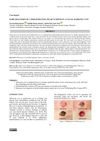 October 2023 in “Animal production science”
October 2023 in “Animal production science” Vitamin A deficiency changes cattle hair structure, while pregnancy may improve it, suggesting hair can indicate cattle health.
 July 2023 in “International Journal of Cosmetic Science”
July 2023 in “International Journal of Cosmetic Science” Biopolymers are increasingly used in cosmetics for their non-toxicity and skin benefits, with future biotech advancements likely to expand their applications.
 June 2023 in “Historical records of Australian science/Historical Records of Australian Science”
June 2023 in “Historical records of Australian science/Historical Records of Australian Science” George Ernest Rogers was a notable scientist who made important discoveries about hair and wool proteins.
 June 2023 in “Experimental dermatology”
June 2023 in “Experimental dermatology” Pubic hair has a thicker, more protective outer layer than scalp hair, possibly due to evolution.

The document concludes that understanding hair's composition and the effects of treatments can lead to better hair care products.
 January 2023 in “Journal of pharmacognosy and phytochemistry”
January 2023 in “Journal of pharmacognosy and phytochemistry” Herbal home remedies can effectively treat hair loss with fewer side effects.
 January 2023 in “Skin appendage disorders”
January 2023 in “Skin appendage disorders” Two Hispanic women developed Plica neuropathica, a condition causing tangled hair, possibly due to hair damage and various risk factors.
 November 2022 in “Journal of Investigative Dermatology”
November 2022 in “Journal of Investigative Dermatology” The extract of Silybum marianum, Manganese PCA, and Lespedeza capitata can boost hair growth and extend the growth phase when combined in a serum.
September 2022 in “Health and Medical Journal” Minoxidil and oral antioxidants helped improve hair growth in a patient with hair loss due to lupus.
March 2022 in “Veterinary dermatology” A one-year-old cat had multiple benign skin tumors similar to those known in humans.
 March 2022 in “Folia Medica Indonesiana”
March 2022 in “Folia Medica Indonesiana” The lump on a woman's scalp was a rare, potentially cancerous tumor from the hair follicle, not a common cyst.
February 2022 in “Fibers” Scientists created a non-toxic, sugar-based hair product that can style hair without damage.
January 2022 in “Clinical Cases in Dermatology” A woman's scalp nodule was a common, harmless pilar cyst, treated by surgical removal.
January 2022 in “Journal of clinical and diagnostic research” A rare skin bump with tiny hairs was successfully removed from a man's face.
December 2021 in “2021 International Conference on Electronic Information Technology and Smart Agriculture (ICEITSA)” Chemical dyes damage hair's internal structure more than perming, as shown by a special imaging technique.
 September 2021 in “Kazanskij medicinskij žurnal”
September 2021 in “Kazanskij medicinskij žurnal” Electrical and chemical skin stimulation can improve hair growth.
September 2021 in “CRC Press eBooks” Traumatic alopecia causes hair loss from pulling or rubbing, leading to broken hairs and changes in the scalp.

A spayed dog with vaginal bone structures causing infection was successfully treated by removing the bones and administering medication.
 June 2021 in “Research Square (Research Square)”
June 2021 in “Research Square (Research Square)” Using fat-derived cells to treat hair loss increased hair density and thickness without side effects.
 March 2021 in “bioRxiv (Cold Spring Harbor Laboratory)”
March 2021 in “bioRxiv (Cold Spring Harbor Laboratory)” Removing a specific gene in certain skin cells causes hair loss on the body by disrupting normal hair development.
Pashmina goats produce long hair-fiber due to specific gene expressions related to hair growth.
January 2021 in “대한미용학회지” Boswellia may improve skin inflammation symptoms and positively influence hair growth in mice.
September 2020 in “Oral surgery, oral medicine, oral pathology and oral radiology” The report shows that a rare benign tumor was successfully removed from inside the mouth to avoid scarring on the face.
July 2020 in “International Journal of Cosmetic Science” The study found that minor protein differences between curved and straight Japanese hair are unlikely to significantly affect hair structure.
 May 2020 in “bioRxiv (Cold Spring Harbor Laboratory)”
May 2020 in “bioRxiv (Cold Spring Harbor Laboratory)” The study found that certain genes are important for hedgehog skin appendage development and immunity, with spines possibly evolving for protection and infection resistance.
February 2020 in “Oxford University Press eBooks” The alpha-helix was confirmed as a key structure in proteins.

Researchers developed a method to identify and measure different animal hair fibers in textiles, successfully distinguishing materials like cashmere from cheaper fibers.

Hair fibers degrade and change color in very basic water.
November 2016 in “Oncology Letters” Milia may come from the outer part of the hair follicle.

The research found that people's hair proteins vary, especially by ethnicity and body part, which could help identify individuals in forensic science.
















